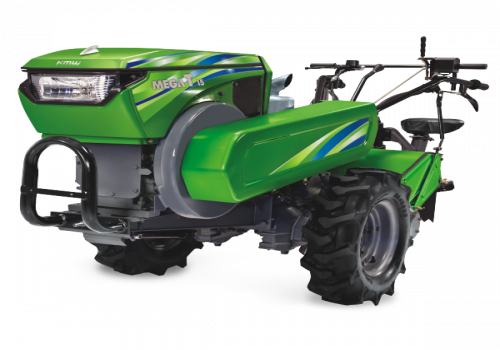A power tiller, commonly referred to as a rotary tiller or rotavator, is a multipurpose agricultural tool used to cultivate soil prior to planting crops. It serves as a mechanized alternative to traditional manual methods of tilling and plowing, reducing the physical effort and time required for soil preparation.
Key features of a power tiller include a set of rotating blades or tines that are attached to a horizontal shaft powered by an engine. These blades dig into the soil, breaking it up and turning it over to create a loose and fine-textured seedbed. The machine's design allows it to work efficiently even in compact or hard soils, making it an essential tool for both small-scale and large-scale farming operations.
Power tillers offer several advantages:
1. Time and Labor Savings: With a power tiller, farmers can cover larger areas of land in a shorter amount of time compared to manual methods. This efficiency translates to increased productivity and allows farmers to make the most of favorable planting windows.
2. Improved Soil Structure: The rotating blades of the power tiller break up compacted soil, improving its aeration, water retention, and nutrient distribution. This helps create an optimal environment for seeds to germinate and plants to grow.
3. Weed Control: Power tillers not only prepare the soil but also help control weeds. By uprooting and burying weeds during the tilling process, the machine reduces competition for nutrients and sunlight, giving crops a better chance to thrive.
4. Versatility: Power tillers can be used for various tasks beyond initial soil preparation, such as incorporating organic matter into the soil, mixing fertilizers, and creating seedbeds for different crops.
5. Cost-Effective: While there is an initial investment in purchasing a power tiller, the long-term benefits in terms of increased yield and reduced labor costs can outweigh the upfront expense.
6. Reduced Physical Strain: Using a power tiller significantly reduces the physical strain on farmers, leading to fewer instances of fatigue and injuries associated with manual tilling.
7. Precision and Consistency: Power tillers provide consistent and uniform soil tilth, contributing to more even crop emergence and growth.
However, it's important to note that improper use of power tillers can lead to negative impacts, such as soil erosion and compaction. Therefore, it's essential for farmers to receive proper training on how to operate and maintain these machines correctly.
Top Power Tiller Brands in India
Certainly, here's a concise overview of the top power tiller brands in India:
1. Kubota Tractor: Renowned Japanese manufacturer offering high-quality, durable power tillers with advanced technology for various farming needs.
2. KMW by Kirloskar: Indian conglomerate providing robust KMW power tillers designed for diverse soil and terrain conditions, favored by local farmers.
3. VST Shakti: Indian company specializing in innovative and user-friendly power tillers and compact tractors, optimizing soil preparation and cultivation.
Keep in mind that market dynamics can change, so always stay updated with recent information and reviews when considering a purchase.
Conclusion
In conclusion, the power tiller stands as a transformative force in modern agriculture, streamlining soil preparation and planting processes while yielding manifold benefits. Its mechanized efficiency saves time and labor, fostering increased productivity and precision. Enhanced soil structure, weed control, and versatile applications underscore its indispensability for varied crops. While the aforementioned top brands, Kubota Tractor, KMW by Kirloskar, and VST Shakti, exemplify excellence, prudent operation, and maintenance remain imperative to mitigate potential downsides. As agriculture evolves, the power tiller remains a vital tool, embodying technological progress that empowers farmers and cultivates sustainable growth.



